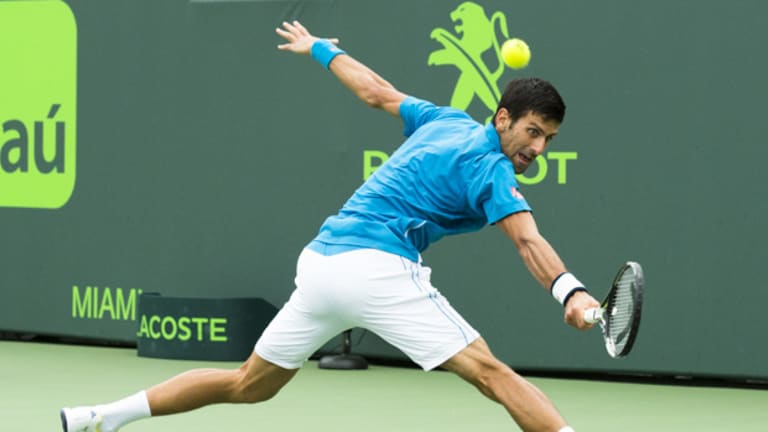KEY BISCAYNE, FLA.—There’s a vivid, and perhaps overly vicious, phrase in basketball that’s used when a spectacular shot puts a game out of reach: “The dagger.”
Daggers by their nature come near the end of a game, typically with less than two minutes to go. In tennis, they usually happen when a player who has won the first set belts a winner to go up a break late in the second, and takes any remaining wind out of his opponent’s sails. So it may be a measure of Novak Djokovic’s dominance at the moment that he essentially put his Miami Open final against Kei Nishikori out of reach when there were still nine games left to be played.
Djokovic had scratched his way through a break-filled, 6-3 first set that was as flat as the gray skies above Key Biscayne. Now it was 30-30 on Nishikori’s serve in the opening game of the second. Both players had loosened up a little, and they pushed each other through the best and longest rally of the match. Finally, at around the rally's 30th shot, Djokovic surprised Nishikori with a short backhand. It wasn’t a dropper, exactly, but it was enough to throw Kei off and win him the point. A minute later, Nishikori, breathing heavily, missed a volley and was broken. There was still nearly a set to go, but the feeling in the stadium and on the court told you this one was over. Forty minutes later, it was, 6-3, 6-3.
With his never-in-doubt victory, Djokovic won his sixth straight match and seventh straight set over Nishikori. It was a day when Djokovic was always a step and a thought ahead. When Nishikori guessed down the line, Djokovic went crosscourt. When Nishikori jumped to return what he thought would be a short second serve, he discovered, too late, that Djokovic had put a little extra kick on the ball to take it out of his strike zone. When Nishikori went for his first serve and missed it, he lost the point. When he tried to be safe and get his first serve in, he lost the point just as often.
“It was a really tough one,” Nishikori said. “He has great defense, so it’s tough to break his game.”
